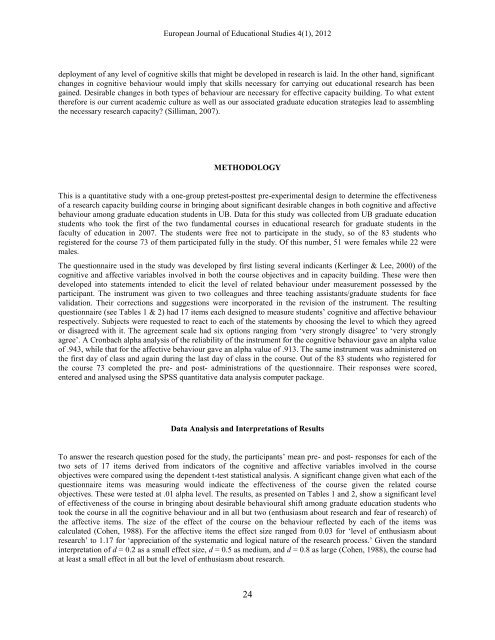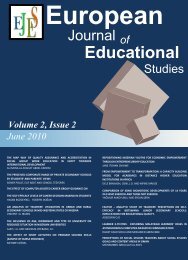Volume 4 Issue 1 (February 2012) - Ozean Publications
Volume 4 Issue 1 (February 2012) - Ozean Publications
Volume 4 Issue 1 (February 2012) - Ozean Publications
You also want an ePaper? Increase the reach of your titles
YUMPU automatically turns print PDFs into web optimized ePapers that Google loves.
European Journal of Educational Studies 4(1), <strong>2012</strong><br />
deployment of any level of cognitive skills that might be developed in research is laid. In the other hand, significant<br />
changes in cognitive behaviour would imply that skills necessary for carrying out educational research has been<br />
gained. Desirable changes in both types of behaviour are necessary for effective capacity building. To what extent<br />
therefore is our current academic culture as well as our associated graduate education strategies lead to assembling<br />
the necessary research capacity (Silliman, 2007).<br />
METHODOLOGY<br />
This is a quantitative study with a one-group pretest-posttest pre-experimental design to determine the effectiveness<br />
of a research capacity building course in bringing about significant desirable changes in both cognitive and affective<br />
behaviour among graduate education students in UB. Data for this study was collected from UB graduate education<br />
students who took the first of the two fundamental courses in educational research for graduate students in the<br />
faculty of education in 2007. The students were free not to participate in the study, so of the 83 students who<br />
registered for the course 73 of them participated fully in the study. Of this number, 51 were females while 22 were<br />
males.<br />
The questionnaire used in the study was developed by first listing several indicants (Kerlinger & Lee, 2000) of the<br />
cognitive and affective variables involved in both the course objectives and in capacity building. These were then<br />
developed into statements intended to elicit the level of related behaviour under measurement possessed by the<br />
participant. The instrument was given to two colleagues and three teaching assistants/graduate students for face<br />
validation. Their corrections and suggestions were incorporated in the revision of the instrument. The resulting<br />
questionnaire (see Tables 1 & 2) had 17 items each designed to measure students‟ cognitive and affective behaviour<br />
respectively. Subjects were requested to react to each of the statements by choosing the level to which they agreed<br />
or disagreed with it. The agreement scale had six options ranging from „very strongly disagree‟ to „very strongly<br />
agree‟. A Cronbach alpha analysis of the reliability of the instrument for the cognitive behaviour gave an alpha value<br />
of .943, while that for the affective behaviour gave an alpha value of .913. The same instrument was administered on<br />
the first day of class and again during the last day of class in the course. Out of the 83 students who registered for<br />
the course 73 completed the pre- and post- administrations of the questionnaire. Their responses were scored,<br />
entered and analysed using the SPSS quantitative data analysis computer package.<br />
Data Analysis and Interpretations of Results<br />
To answer the research question posed for the study, the participants‟ mean pre- and post- responses for each of the<br />
two sets of 17 items derived from indicators of the cognitive and affective variables involved in the course<br />
objectives were compared using the dependent t-test statistical analysis. A significant change given what each of the<br />
questionnaire items was measuring would indicate the effectiveness of the course given the related course<br />
objectives. These were tested at .01 alpha level. The results, as presented on Tables 1 and 2, show a significant level<br />
of effectiveness of the course in bringing about desirable behavioural shift among graduate education students who<br />
took the course in all the cognitive behaviour and in all but two (enthusiasm about research and fear of research) of<br />
the affective items. The size of the effect of the course on the behaviour reflected by each of the items was<br />
calculated (Cohen, 1988). For the affective items the effect size ranged from 0.03 for „level of enthusiasm about<br />
research‟ to 1.17 for „appreciation of the systematic and logical nature of the research process.‟ Given the standard<br />
interpretation of d = 0.2 as a small effect size, d = 0.5 as medium, and d = 0.8 as large (Cohen, 1988), the course had<br />
at least a small effect in all but the level of enthusiasm about research.<br />
24

















